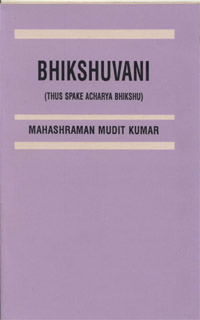मूर्ख
A Fool
८०. खोटो नांणो ने सांतरों, एकण नोली मांय I
ते भोला रे हाथे दियां, त्यांसूं जुआ किया किम जाय II
The genuine and the counterfeit coins are in the same waist belt. Can a fool separate them?
८१. ज्यूं साधु असाधु लोक में, दोयां रो एक आकार I
भोला भिन्न नहीं लेखवे, ते जाणे नहिं आचार II
Likewise, the hermit and the knave are similarly dressed. Unwise people cannot distinguish between the two because they have no knowledge of righteousness.
मोह
Attachment
८२. जेंहर सरीर में त्यां लगे, मीठा लागे नींब पांन I
ज्यूं कर्म उदय हुवे जीव रे जब, लागे भोग इमरत समांन II
The leaves of the margosa tree taste sweet so long as the body is poisoned. Similarly, sexual pleasures are felt as sweet as nectar so long as the deluding karma is active.
रक्षक - भक्षक
Saviour-Destroyer
८३. दवरो दाधो पड्यों जाय जला में, पिण जल में लागी लाय I
तो किसी ठोड करें ठंडाई, किसी ठोड साता हुवें ताहि II
A man who has sustained burn injuries as a result of a forest fire tries to seek relief in water. Where would he go and seek relief if the water itself were set afire.
राग
Love
८४.जीव ने जीवां बचावे तिण सूं, बंध जाएं तिण रो राग सनेह I
जो परभव में ऊ आय मिलें तो, देखत पांण जागे तिण सूं नेह II
When one living being saves the life of another living being, a bond of love develops. When the latter meets the former in the next birth, love wells up in the heart.
राग-द्वेष
Love and Hatred
८५. मित्री सूं मित्रीपणों चलीयों जावें, वेंरी सूं वेंरीपणों चलीयो जावें I
ऐं तो राग धेष कर्मा रा चाला, ते श्री जिणधर्म मांहे नहीं आवें II
Both here and in the hereafter the bonds of love and hatred continue between friends and enemies respectively. Both love and hate are Karmik passions. They are no part of the radiant religion of the Teerthankars.
८६. एकण रे दे रे चपेटी, एकण रो दे उपद्रव मेटी I
ए तो राग द्वेष नों चालो, दसवीकालक संभालो II
One person is slapped; an other's misdeeds are covered up. This stunt is based on love and hate. This is proved by the sutra 'Dashvaikalika'.
वाणीविवेक
Discrimination of Speech
८७. भाषा तोलणी ए, पछे बोलणी ए I
Weigh your words before you speak.
विषय
Sexual pleasure
८८. नारी रुप दीवलो, भोगी पुरष पतंग I
झंपे सुख रे कारणे, दाझें कोमल अंग II
The good looks of a woman are like a burning lamp and one who enjoys it is like a moth. For pleasure the latter falls into the lap of the burning lamp and burns its tender body.
विसंगति
Contradictory
८९. हेत मांहि तो दोषण ढांके, हेत टूटां कहतो नहीं सांके I
तिणरी किम आवे परतीत, उणने जाण लेणो विपरीत II
When two are in good friendship one covers up the defects of the other and when the friendship is broken one does not hesitate in broadcasting the loopholes of the other. How to trust such a person? His thinking and action are contradictory.
वीतराग-धर्म
Religion of the Master
९०. घूघू नें गमतो लागे नहीं, चोर नें चांदणो नहीं सुहाय I
ज्यूं भारी कर्मा जीव तेहनें थी, जिनधर्म नावें दाय II
An owl does not like the sun. A thief dislikes moonlight. Likewise those who have accumulated heavy karmas do not like the religion of the Master.
व्रत
A Meritorious Act of Devotion
९१. साध नें श्रावक रतनां री माला, एक मोटी दूजी नांनी I
गुण गुथ्यां च्यारुं तीरथ नां, इविरत रह गइ कांनी II
Both the sadhu and shravak (follower of Jain monks) are like a garland of gems, the former being bigger and the latter smaller. The binding factor of the garlands is the trinity-right faith, right knowledge and right character. The tint of non-abstinence remains out.
विनीत-अविनीत
The Modest and the Immodest
९२. समझाया विनीत अविनीत रा, त्यांमें फेर कितोयक होय I
ज्यूं तावड़ो नें छांहडी, इतरो अन्तंर जोय II
Those instructed by the modest and the immodest are as far apart as sunshine and shade.
९३. केइ विनीत अविनीत भण्या दोनूं गुर कनें,
पिण विने सहीत भणियो विनीत I
तिणनें सूधोई सूझे ने सूधो अरथ करें,
भण भण ऊँधो पडे अविनीत II
Both the modest and the immodest learnt from the same guru. The former did it with modesty and grabbed the right meaning as taught by the guru and gives the right interpretation. On the other hand, the immodest gives the wrong interpretation, despite what he was taught1
९४. विनीत तणा समझाविया, साल दाल ज्यूं भेला होय जाय I
अविनीत रा समझाविया, ते कोकला ज्यूं कांनी थाय II
He who has been instructed by the modest becomes one with the guru like rice and split pulse, whereas he who has been taught by the immodest keeps away as do the slices of a cucumber.
 Mahashraman Mudit Kumar
Mahashraman Mudit Kumar
